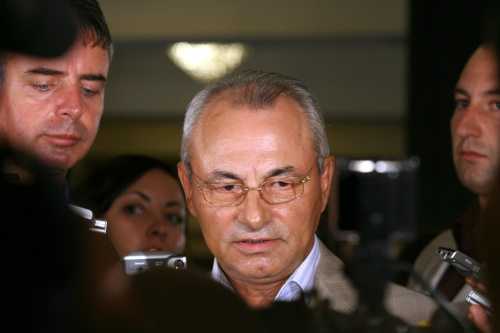
Bulgaria’s Supreme Administrative Court exonerated Monday Ahmed Dogan, leader of the opposition ethnic Turkish party, from conflict of interests.
Two of the three magistrates trying the case, ruled Dogan, who received huge consulting fees on hydro energy projects while his party was in power, was not in conflict of interests because his consulting contracts were signed before the passing of the law that provides for sanctions for such activities.
The ruling of the Supreme Administrative Court (VAS) says that there is no evidence the leader of the Movement for Rights and Freedoms (DPS) as a Member of the Parliament took part in a vote benefiting the company which paid the fee.
Magistrates Violeta Glavinova and Iliyana Slavovska also believe that in order to find the defendant guilty, the Court must establish private interest accompanied by aimed profit and that the said interest influenced the MP’s objective and impartial fulfillment of parliamentary duties.
Magistrate Marina Mihaylova, however, has signed the ruling with “particular judgment.” She writes that Dogan has committed conflict of interests because he received the major part of the fee after the passing of the bill that mandates him to declare such conflict.
Mihaylova further cites the DPS leader’s scandalous pre-election statement in the village of Kochan on June 18, 2009 where he declared to supporters: “I am the instrument in power that allocates the portions to the firms in the country. I want you to be very aware of this fact.”
The Court ordered the Parliament to refund legal expenses to Dogan. His defense attorney asked for BGN 48 000, but the magistrates fixed the amount at the symbolic BGN 150.
The ruling can be appealed before a five-judge panel of VAS.
The leader of the ethnic Turkish party, which was a member of the former Three-Way Coalition cabinet, allegedly pocketed BGN 1.5 M as a consultant of four large-scale hydroelectricity projects, funded by the state – “Tsankov Kamak,” “Dospat,” “Gorna Arda” and “Tundzha” Dam.
The scandal erupted in May after a visit of Prime Minister Boyko Borisov to the site of the hydroelectric power plant “Tsankov Kamak,” where he revealed that a huge hike in the initial price has been discovered.
The money for the hydro power plant “Tsankov Kamak,” from where Dogan took the sky-high payment as an “expert,” was paid by the state-owned National Electricity Distribution Company (NEK), left in tatters after the ruling of the previous cabinet.
The new center-right Citizens for European Development of Bulgaria (GERB) party government of Bulgaria was elected on an anti-corruption platform in July, 2009, and on the promise to bring to justice those involved in huge-scale corruption schemes.
The latest embezzlement allegations against Ahmed Dogan have been widely considered to be a litmus test for the government’s willingness to do so in practice.
The trial was launched on a claim filed by the Parliamentary Anti-corruption Committee.
At the start of proceedings at the Supreme Administrative Court on September 2 officials had to try Dogan in absentia.
He had envoyed his lawyer Ivan Elenski, who stated that his client has not entered into a conflict of interests and that the contents of the committee report are “figments of the imagination.”
The Supreme Administrative Court on its part decreed that Dogan show evidence of professional qualification or competence in the areas of construction, mining and hydrology, for which he received consultant fees, as well as to produce a report on the consultancy work he actually did for the projects.
The Administrative Court also ordered the Council of Ministers to provide documents with which it had appointed contractors for Tsankov Kamak and the other projects and the Ministry of Economy and Energy and the National Electric Company – to provide evidence on the financing of the projects.
The court then mandated a deadline of seven days for documents to be provided by the above bodies and individuals.
If found guilty, Dogan would have faced a fine from BGN 1 000 to BGN 3 000 and confiscation of the payment he received as an expert.
The Chair of the Parliamentary Anti-corruption Committee, Valentin Nikolov, already vowed to file an appeal.
, October 18, 2010